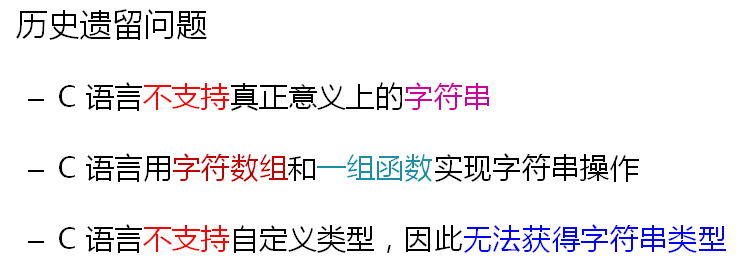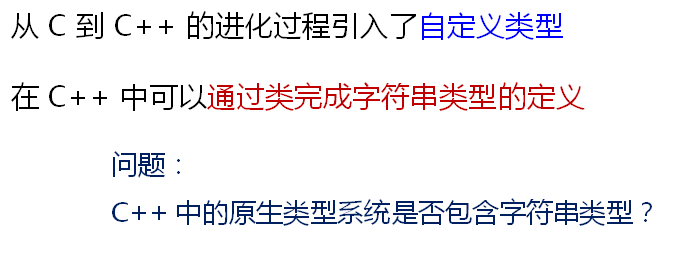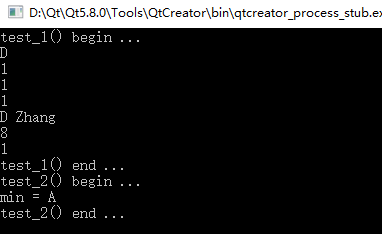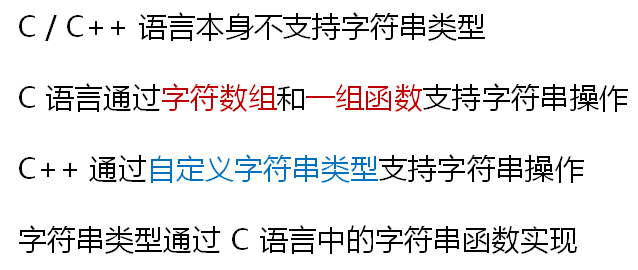

c++中用STL封装了字符串类,但是这是不通用的。



实现字符串类,就是用面向对象的方式封装C语言对字符串的操作。
添加DTString.h文件:
1 #ifndef DTSTRING_H 2 #define DTSTRING_H 3 4 #include "Object.h" 5 6 namespace DTLib 7 { 8 9 class String : Object 10 { 11 protected: 12 char* m_str; 13 int m_length; 14 15 void init(const char* s); 16 public: 17 String(); 18 String(char c); 19 String(const char* s); 20 String(const String& s); 21 22 int length() const; 23 const char* str() const; 24 25 bool operator == (const String& s) const; 26 bool operator == (const char* s) const; 27 28 bool operator != (const String& s) const; 29 bool operator != (const char* s) const; 30 31 bool operator > (const String& s) const; 32 bool operator > (const char* s) const; 33 34 bool operator < (const String& s) const; 35 bool operator < (const char* s) const; 36 37 bool operator >= (const String& s) const; 38 bool operator >= (const char* s) const; 39 40 bool operator <= (const String& s) const; 41 bool operator <= (const char* s) const; 42 43 String operator + (const String& s) const; 44 String operator + (const char* s) const; 45 String operator += (const String& s); 46 String operator += (const char* s); 47 48 String& operator = (const String& s); 49 String& operator = (const char* s); 50 String& operator = (char c); 51 52 ~String(); 53 }; 54 55 } 56 57 58 #endif // DTSTRING_H
添加DTString.cpp文件:
1 #include <cstring> 2 #include <cstdlib> 3 #include "DTString.h" 4 #include "Exception.h" 5 6 using namespace std; 7 8 namespace DTLib 9 { 10 11 void String::init(const char* s) 12 { 13 m_str = strdup(s); 14 15 if( m_str ) 16 { 17 m_length = strlen(m_str); 18 } 19 else 20 { 21 THROW_EXCEPTION(NoEnoughMemoryException, "No memory to create string object ..."); 22 } 23 } 24 25 String::String() 26 { 27 init(""); 28 } 29 30 String::String(const char* s) 31 { 32 init(s ? s : ""); //空指针就转换成空字符串 33 } 34 35 String::String(const String& s) 36 { 37 init(s.m_str); 38 } 39 40 String::String(char c) 41 { 42 char s[] = {c, '\0'}; 43 44 init(s); 45 } 46 47 int String::length() const 48 { 49 return m_length; 50 } 51 52 const char* String::str() const 53 { 54 return m_str; 55 } 56 57 bool String::operator == (const String& s) const 58 { 59 return ( strcmp(m_str, s.m_str) == 0 ); 60 } 61 62 bool String::operator == (const char* s) const 63 { 64 return ( strcmp(m_str, s ? s : "") == 0 ); 65 } 66 67 bool String::operator != (const String& s) const 68 { 69 return !(*this == s); 70 } 71 72 bool String::operator != (const char* s) const 73 { 74 return !(*this == s); 75 } 76 77 bool String::operator > (const String& s) const 78 { 79 return (strcmp(m_str, s.m_str) > 0); 80 } 81 82 bool String::operator > (const char* s) const 83 { 84 return (strcmp(m_str, s ? s : "") > 0); 85 } 86 87 bool String::operator < (const String& s) const 88 { 89 return (strcmp(m_str, s.m_str) < 0); 90 } 91 92 bool String::operator < (const char* s) const 93 { 94 return (strcmp(m_str, s ? s : "") < 0); 95 } 96 97 bool String::operator >= (const String& s) const 98 { 99 return (strcmp(m_str, s.m_str) >= 0); 100 } 101 102 bool String::operator >= (const char* s) const 103 { 104 return (strcmp(m_str, s ? s : "") >= 0); 105 } 106 107 bool String::operator <= (const String& s) const 108 { 109 return (strcmp(m_str, s.m_str) <= 0); 110 } 111 112 bool String::operator <= (const char* s) const 113 { 114 return (strcmp(m_str, s ? s : "") <= 0); 115 } 116 117 String String::operator + (const String& s) const 118 { 119 return (*this + s.m_str); 120 } 121 122 String String::operator + (const char* s) const 123 { 124 String ret; 125 126 int len = m_length + strlen(s ? s : ""); 127 128 char* str = reinterpret_cast<char*>(malloc(len + 1)); 129 130 if( str ) 131 { 132 strcpy(str, m_str); 133 strcat(str, s ? s : ""); 134 135 free(ret.m_str); 136 137 ret.m_str = str; 138 ret.m_length = len; 139 } 140 else 141 { 142 THROW_EXCEPTION(NoEnoughMemoryException, "No memory to create str object..."); 143 } 144 145 return ret; 146 } 147 String String::operator += (const String& s) 148 { 149 return (*this = *this + s.m_str); 150 } 151 152 String String::operator += (const char* s) 153 { 154 return (*this = *this + s); 155 } 156 157 String& String::operator = (const String& s) 158 { 159 return (*this = s.m_str); 160 } 161 162 String& String::operator = (const char* s) 163 { 164 if( m_str != s ) 165 { 166 char* str = strdup(s ? s: ""); 167 168 if( str ) 169 { 170 free(m_str); 171 172 m_str = str; 173 m_length = strlen(m_str); 174 } 175 else 176 { 177 THROW_EXCEPTION(NoEnoughMemoryException, "No memory to create str object..."); 178 } 179 } 180 181 return *this; 182 } 183 184 String& String::operator = (char c) 185 { 186 char s[] = {c, '\0'}; 187 188 return (*this = s); 189 } 190 191 String::~String() 192 { 193 free(m_str); 194 } 195 196 }
测试程序如下:
1 #include <iostream> 2 #include "DTString.h" 3 4 using namespace std; 5 using namespace DTLib; 6 7 void test_1() 8 { 9 cout << "test_1() begin ... " << endl; 10 11 String s; 12 13 s = 'D'; 14 15 cout << s.str() << endl; 16 cout << s.length() << endl; 17 cout << (s == "D") << endl; 18 cout << (s > "CCC") << endl; 19 20 s += " Zhang "; 21 22 cout << s.str() << endl; 23 cout << s.length() << endl; 24 cout << (s == "D Zhang ") << endl; 25 26 cout << "test_1() end ... " << endl; 27 } 28 29 void test_2() 30 { 31 cout << "test_2() begin ... " << endl; 32 33 String a[] = {"E", "D", "C", "B", "A"}; 34 String min = a[0]; 35 36 for(int i = 0; i < 5; i++) 37 { 38 if( min > a[i] ) 39 { 40 min = a[i]; 41 } 42 } 43 44 cout << "min = " << min.str() << endl; 45 46 cout << "test_2() end ... " << endl; 47 } 48 49 int main() 50 { 51 test_1(); 52 53 test_2(); 54 55 return 0; 56 }
运行结果如下:

小结:



